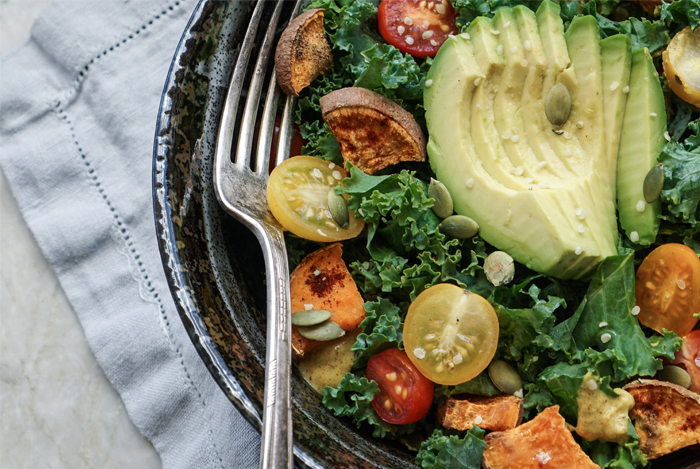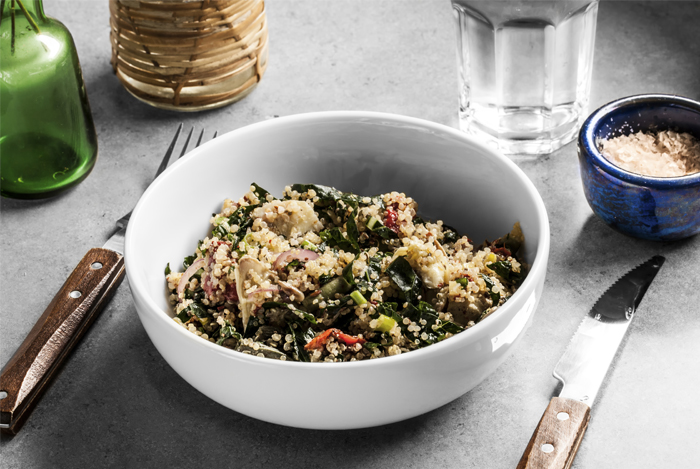The Paleo diet, also called the caveman diet, is a verifiable weight-loss craze.
And it makes a lot of sense. When you think of a caveman, you picture someone tall, heavily-muscled, and in superb health. Why wouldn’t you want to be like him?
But some would-be nutritionists go even further. When they imagine our caveman ancestor, they see him as stress-free, perfectly suited to his environment, and always full on food that’s perfect for his body.
That’s where the Paleo diet comes in. People on the diet claim to have “cracked the code” of proper nutrition – that they’re doing what’s natural for our bodies.
Are they right? Is the Paleo lifestyle really the way we should all aspire to live?
Scientists don’t seem to think so. In fact, they’re pretty strongly against the whole idea.
So, with this disagreement in mind, let’s dig down deep into the Paleo diet.
What is the Paleo Diet?

Our diets have always been an important part of our evolution, and we have definitely inherited a few adaptations from our Paleolithic ancestors. And that’s the major thrust of the logic behind the Paleo diet.
The theory behind the diet is pretty straightforward: our hunter-gatherer ancestors survived on meat and fish that weren’t saturated with antibiotics or growth hormones.
They also ate fresh fruits and vegetables they simply found in their environments – until they developed agriculture. The Agricultural Revolution came around 10,000 years ago, and introduced brand new crops into our diets.
Fitness author and blogger Mark Sisson says the rulebook for the Paleo diet “allows you to control how your genes express themselves in order to build the strongest, leanest, healthiest body possible, taking clues from evolutionary biology.”
The diet has been around since the 1960s and comes in a variety of flavors. Mostly, it’s defined by what its dieters do not consume – mainly dairy, processed grains, and processed sugars of any kind.
The critics of the diet range in negativity, from the lukewarm – “Well, it’s not the worst way you could eat.” – to the very heated – “It’s nonsensical and maybe even dangerous.”
But, for there to be so many strict followers of the diet, it must be very well-regarded by its supporters, right?
The Ranking System

Each year, U.S. News presents a ranked list of every major diet out there, from best to worst.
For a diet as popular as the Paleo diet, you’d expect it to land somewhere in the top 5. Or at the very least, the top 10.
Not even close.
The Paleo diet comes close to dead last at number 36 – tied with the Dukan diet and ranked worse than the Raw Food diet and a whole range of other questionable diets.
The magazine said, “Experts took issue with the [Paleo] diet on every measure.”
So what’s the big deal? What makes the Paleo diet so hated by experts?
What the Science Says

The majority of nutritionists agree that the Paleo diet does get at least one thing right: cutting down on highly modified processed foods.
White bread and other refined flour products, fake cheeses, certain packaged meats, chips, and sugary cereals are absolutely awful for your diet. They offer less protein, fiber, and iron than their unprocessed equivalents. They also tend to be full of excess sodium, added sugar, and preservatives that could increase the risk of chronic disease and cancers.
But because the Paleo diet bans so much more than just these highly processed foods, it raises a lot of academic eyebrows.
As Scientific American put it, “The Paleo diet is founded more on privilege than on logic. Hunter-gatherers in the Paleolithic hunted and gathered because they had to. Paleo dieters attempt to eat like hunter-gatherers because they want to.
The experts say that any diet that restricts certain food groups and emphasizes others is just not balanced. And they emphasize that there’s no evidence to prove that Paleo dieters live longer, or are healthier than others who follow a more modern diet.
A study published in the Quarterly Review of Biology from researchers at Georgia State University and Kent State University says there’s no accurate version of the Paleo diet.
They found that although our earliest ancestors had teeth unfit for many plants, they likely ate whatever was available to them. Cavemen who lived in the north relied on a meat-heavy diet, while those near the equator relied on plants.
Another study found that many ancient hunter-gatherers ate tons of carbs found naturally in their environments millennia before the cultivation of grain.
Michael Pollan, the world-renowned author of The Omnivore’s Dilemma and Cooked: A Natural History of Transformation, says the Paleo diet has it all wrong:
“I don’t think we really understand well the proportions in the ancient diet. Most people who tell you with great confidence that this is what our ancestors ate – I think they’re kind of blowing smoke.”
Paleolithic Humans vs. Modern Humans

The idea that our genetics have been set in stone since the Stone Age is totally incorrect.
For instance, within the past 7,000 years, our bodies have adapted to eating dairy by developing lactose tolerance. Before now, the enzyme that broke down sugars in milk shut down after infancy.
Similarly, the organisms we share our bodies with – our gut bacteria – have evolved even faster. We don’t have direct evidence of which species lived in our Paleolithic ancestors, but we know that our microbial communities do not match theirs in the slightest.
Our evolved gut bacteria allows us to process a brand new range of foods. The idea that we should go back to a set way of eating tens of thousands of years old is, well, backwards.
“Hominids didn’t spread first across Africa, and then the entire globe, by utilizing just one foraging strategy or sticking to a precise mix of carbohydrates, proteins, and fats,” says Dr. Ken Sayers of Georgia State University. “We did it by being ever so flexible, both socially and ecologically.”
In fact, Dr. Sayers thinks cavemen probably weren’t very effective hunters at all. Their strengths would have lied in foraging for other foods – especially given the scarcity of most animals in wintertime.
“It is likely that the basic dietary composition varied greatly at different places and times,” he continues. “This would include the percentage of the diet composed of animal foods.”
And when it comes down to it, ancient humans had far shorter life spans. It’s very difficult to say if their diets were actually healthier – and because they didn’t have a chance to live as long as we do, they didn’t have time to suffer the negative effects of their diet-by-necessity.
The Key Problems

- The Paleo diet is difficult to characterize. Creating an actual picture of what ancient humans consumed is incredibly difficult, and involves mostly guesswork. Supporters of the diet try to recommend a certain percentage of energy that should come from protein, fats, and carbohydrates, but these estimates vary wildly.
“When you’re trying to reconstruct the diet of human ancestors,” says Dr. Sayers, “you want to look at a number of things, including the habitats they lived in, the potential foods that were available, how valuable those various food items would have been in relation to their energy content and how long it takes to handle a food item.
In other words, the Paleo diet is far too oversimplified to properly replicate an ancient human diet.
- Food is very different today than it was for hunter-gatherers. The meat we eat today is nothing like that of the animals our ancestors hunted for survival. For one, there were no cows roaming the woods.
So unless you have access to grass-fed, free-range meat or wild game, you should incorporate a whole heck of a lot more plant-based proteins and fish in your diet.
Dr. Sayers says: “The foods that we’re eating today, even in the case of fruits and vegetables, have been selected for desirable properties and would differ from what our ancestors were eating.”
- We need the nutrients and microbes found in foods the Paleo diet excludes. People who follow the Paleo diet may not get enough:
- Calcium
- Folate
- Iron
- Magnesium
If Paleo-heads would just stick to a well-rounded diet, they wouldn’t have these problems.
On top of that, because they eliminate bread and most grains altogether, they miss out on the microbes that benefit our gut bacteria. And it’s not just grains that are powered by microbes – you also find them in beer, cheese, yogurt, miso, sauerkraut, and pickles.
Before we had refrigeration, fermentation was one of our best means of preserving foods. The microbes in those fermented foods play an important role in our health, and on Paleo you just might miss out.
Should You Try the Paleo Diet?

The author Paleofantasy, evolutionary biologist Marlene Zuk, says that understanding how we evolved over time could very well help us make smarter dietary choices. But, she says, the Paleo diet is not the answer.
Instead, the Paleo diet seems to be built upon a fantasy of a time when our bodies, minds, and behavior was in sync with our environments. But no such time existed.
“We and every other living thing have always lurched along in evolutionary time, with the inevitable trade-offs that are a hallmark of life,” Zuk wrote in her book.
However, the Paleo crowd passionately defends the ancestral diet. Chris Kresser, who practices integrative and functional medicine in Berkeley, California, credits the diet for his good health and general wellbeing after years of suffering from a painful digestive disease.
He says, “Today, I’m blessed with excellent health, a loving family, and a flourishing practice… There is broad consensus among scientists that our Paleolithic ancestors consumed primarily meat, fish, vegetables, fruits, nuts, seeds, and starchy tubers.”
Scientists and critics of the Paleo diet do not deny this – what they take issue with is the idea that we should eat exactly as our ancestors did.
So, should you try the Paleo diet?
That’s entirely your decision based on your unique health situation. But if you choose to follow the Paleo diet because you think the justifications for it are true – that they’re based on hard evidence about what our ancestors consumed – know you’re sadly misinformed.
What do you think about the Paleo diet?
The post What’s Wrong With the Paleo Diet? appeared first on Nutrition Secrets.
http://www.nutritionsecrets.com/whats-wrong-with-the-paleo-diet/
No comments:
Post a Comment